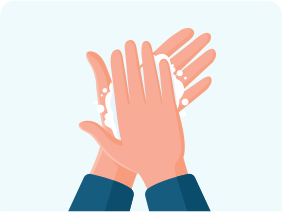Signs of infection
As infection can be one of the most serious side effects of chemotherapy, it is important that you know what the symptoms of infection are.
If you have any of the following signs of infection1, report them to your doctor immediately:
- Temperature (fever) of 38ºC or higher
- Chills and sweats
- Change in cough or new cough
- Sore throat or new mouth sore
- Shortness of breath
- Nasal congestion
- Stiff neck
- Burning or pain with urination
- Unusual vaginal discharge or irritation
- Increased urination
- Redness, soreness, or swelling in any area, including surgical wounds and ports
- Diarrhoea
- Vomiting
- Pain in the abdomen or rectum
- New onset of pain
- Changes in skin colour, urination, and mental status







